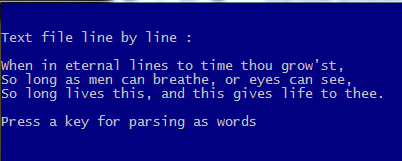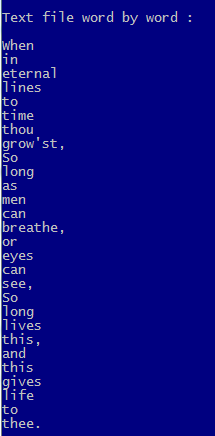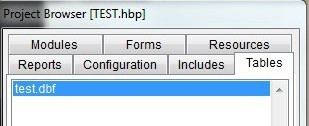Harbour Make (hbmk2) 3.2.0dev (Rev. 18805)
Copyright (c) 1999-2013, Viktor Szakáts
http://harbour-project.org/
Syntax:
hbmk2 [options] [<script[s]>] <src[s][.prg|.c|.obj|.o|.rc|.res|.def|.po|.pot|.hbl|@.clp|.d|.ch]>
Options:
-o<outname> output file name
-l<libname> link with <libname> library. <libname> should be without
path, extension and ‘lib’ prefix (unless part of
libname). Do not add core Harbour libraries, they are
automatically added as needed.
-L<libpath> additional path to search for libraries
-i<p>|-incpath=<p> additional path to search for headers
-static|-shared link with static/shared libs
-mt|-st link with multi/single-thread Harbour VM
-gt<name> link with GT<name> GT driver, can be repeated to link
with more GTs. First one will be the default at runtime
-inc[-] enable/disable incremental build mode (default: disabled)
-hbexe create executable (default)
-hblib create static library
-hbdyn create dynamic library (without linked Harbour VM)
-hbdynvm create dynamic library
-hbimplib create import library
-gui|-std create GUI/console executable
-main=<mainfunc> override the name of starting function/procedure
-request=<func> force function/procedure to be linked
-fullstatic link with all static libs
-pic[-] create position independent object code (always enabled
in -hbdyn/-hbdynvm modes)
-[full|fix]shared create shared Harbour binaries without/with absolute dir
reference to Harbour library (default: ‘fullshared’ when
Harbour is installed on system location, ‘fixshared’
otherwise) (fix/full option in *nix only)
-nulrdd[-] link with nulrdd
-debug[-] add/exclude C compiler debug info. For Harbour level
debug, use Harbour option -b as usual
-optim[-] toggle C compiler optimizations (default: on)
-cpp[-] force C/C++ mode
-cpp=<value> select C++ mode. Allowed values are: def, yes, no
-map[-] create (or not) a map file
-implib[-] create (or not) an import library (in -hbdyn/-hbexe
mode). The name will have a postfix added.
-implib=<output> create import library (in -hbdyn/-hbexe mode) name to
<output> (default: same as output)
-ln=<link> create symbolic link pointing to <output> (<link> is
considered relative to <output>)
-strip[-] strip (no strip) binaries
-trace[-] show commands executed
-beep[-] enable (or disable) single beep on successful exit,
double beep on failure
-ignore[-] ignore errors when running compiler tools (default: off)
-hbcppmm[-] override standard C++ memory management functions with
Harbour ones
-winuni[-] select between UNICODE (WIDE) and ANSI compilation modes
(default: ANSI) (Windows only. For WinCE it is always set
to UNICODE)
-nohblib[-] do not use static core Harbour libraries when linking
-nodefgt[-] do not link default GTs (effective in -static mode)
-nolibgrouping[-] disable library grouping on gcc based compilers
-nomiscsyslib[-] do not add extra list of system libraries to default
library list
-traceonly show commands to be executed, but do not execute them
-warn=<lev> set C compiler warning level
<lev> can be: max, yes, low, no, def (default: yes)
-compr=<lev> compress executable/dynamic lib (needs UPX)
<lev> can be: yes, no, min, max
-run[-] run/do not run output executable
-vcshead=<file> generate .ch header file with local repository
information. SVN, CVS, Git, Mercurial, Bazaar, Fossil and
Monotone are currently supported. Generated header will
define macro _HBMK_VCS_TYPE_ with the name of detected
VCS and _HBMK_VCS_ID_ with the unique ID of local
repository
-tshead=<file> generate .ch header file with timestamp information.
Generated header will define macros _HBMK_BUILD_DATE_,
_HBMK_BUILD_TIME_, _HBMK_BUILD_TIMESTAMP_ with the
date/time of build
-icon=<file> set <file> as application icon. <file> should be a
supported format on the target platform
-manifest=<file> embed manifest <file> in executable/dynamic lib (Windows
only)
-sign=<key> sign executable with <key> (Windows and Darwin only)
-signpw=<pw> use <pw> as password when signing executable (Windows and
Darwin only)
-instfile=<g:file> add <file> in to the list of files to be copied to path
specified by -instpath option. <g> is an optional copy
group (case sensitive), it must be at least two
characters long. In case you don’t specify <file>, the
list of files in that group will be emptied.
-instpath=<g:path> copy target to <path>. if <path> is a directory, it
should end with path separatorm, in this case files
specified by -instfile option will also be copied. can be
specified multiple times. <g> is an optional copy group,
it must be at least two characters long. Build target
will be automatically copied to default (empty) copy
group.
-instforce[-] copy target to install path even if it is up to date
-depimplib[-] enable (or disable) import library generation for import
library sources specified in -depimplibs= options
(default: yes)
-stop[=<text>] stop without doing anything and display <text> if
specified
-echo=<text> echo text on screen
-pause force waiting for a key on exit in case of failure (with
alternate GTs only)
-info turn on informational messages
-quiet[-] suppress all screen messages
-bldf[-] inherit all/no (default) flags from Harbour build
-bldf=[p][c][l] inherit .prg/.c/linker flags (or none) from Harbour build
-F<framework> link with <framework> framework (Darwin only)
-cflag=<f> pass single flag to C compiler
-resflag=<f> pass single flag to resource compiler (Windows only)
-ldflag=<f> pass single flag to linker (executable)
-aflag=<f> pass single flag to linker (static library)
-dflag=<f> pass single flag to linker (dynamic library)
-iflag=<f> pass single flag to import library creation command
-prgflag=<f> pass single flag to Harbour compiler
-runflag=<f> pass single flag to output executable when -run option is
used
-cflag+=<f> pass single flag to C compiler overriding C compiler
flags added by hbmk2 itself. Use with caution.
-3rd=<f> options/flags reserved for 3rd party tools, always
ignored by hbmk2 itself
-env:<e>[<o>[<v>]] alter local environment. <e> is the name of the
environment variable to alter. <o> can be ‘=’ to
set/override, ‘-‘ to delete, ‘+’ to append to the end of
existing value, ‘#’ to insert to the beginning of
existing value. <v> is the value to set/append/insert.
-jobs=<n> start n compilation threads (multiprocess platforms only)
-head=<m> control source header parsing (in incremental build mode)
<m> can be: native (uses compiler to extract
dependencies), full (default, uses simple text parser on
the whole file), dep, off
-rebuild rebuild (in incremental build mode)
-rebuildall rebuild with sub-projects (in incremental build mode)
-clean clean (in incremental build mode)
-workdir=<dir> working directory
(default: .hbmk/plat/comp in incremental mode, OS temp
directory otherwise)
-hbl[=<output>] output .hbl filename. %{hb_lng} macro is accepted in
filename
-lng=<languages> list of languages to be replaced in %{hb_lng} macros in
.pot/.po filenames and output .hbl/.po filenames. Comma
separared list:
-lng=en,hu-HU,de
-po=<output> create/update .po file from source. Merge it with
previous .po file of the same name
-minipo[-] do (not) add Harbour version number and source file
reference to .po (default: add them)
-rebuildpo recreate .po file, thus removing all obsolete entries in
it
-hbx=[<.ch>] Create Harbour header (in .hbx format) with all external
symbols. Empty parameter will disable it.
-autohbc=<.ch:.hbc> <.ch> is a header file name. <.hbc> is a .hbc filename to
be automatically included in case the header is found in
any of the compiled sources. (EXPERIMENTAL)
-deppkgname=<d:n> <d> is the name of the dependency. <n> name of the
package depedency. Can be specified multiple times.
-depkeyhead=<d:h> <d> is the name of the dependency. <h> is the key header
(.h) of the package dependency. Multiple alternative
headers can be specified.
-depoptional=<d:f> <d> is the name of the dependency. <f> can be ‘yes’ or
‘no’, specifies whether the dependency is optional.
Default: no
-depcontrol=<d:v> <d> is the name of the dependency. <v> is a value that
controls how detection is done. Accepted values: no, yes,
force, nolocal, local. Default: content of envvar
HBMK_WITH_<d>
-depincroot=<d:r> <d> is the name of the dependency. Set <r> as root
directory for paths specified in -depincpath options.
-depincpath=<d:i> <d> is the name of the dependency. Add <i> to the header
detection path list.
-depincpathlocal= <d> is the name of the dependency. Add <i> to the header
<d:i> detection path list, where <i> is pointing to a directory
local to the project and containing an embedded (or
locally hosted) dependency.
-depimplibs=<d:dll> <d> is the name of the dependency. Add <dll> to the
import library source list.
-depimplibd=<d:lib> <d> is the name of the dependency. Set generated import
library name to <lib>
-plugin=<filename> add plugin. <filename> can be: .hb, .prg, .hrb
-pi=<filename> pass input file to plugins
-pflag=<f> pass single flag to plugins
Options below are available on command line only:
-target=<script> specify a new build target. <script> can be .prg (or no
extension) or .hbp file. Note that .hbp files are
automatically considered as separate targets.
-hbrun run target
-hbraw stop after running Harbour compiler
-hbcmp|-clipper stop after creating the object files
create link/copy hbmk2 to hbcmp/clipper for the same
effect
-hbcc accept raw C flags
create link/copy hbmk2 to hbcc for the same effect
-hblnk accept raw linker flags
-autohbm[-] enable (or disable) processing of hbmk.hbm in current
directory (default: yes)
-hb10 enable Harbour 1.0.x compatibility mode
-hb20 enable Harbour 2.0.x compatibility mode
-xhb enable xhb mode
-hbc enable pure C mode
-rtlink
-blinker
-exospace emulate Clipper compatible linker behavior
create link/copy hbmk2 to rtlink/blinker/exospace for the
same effect
-hbreg[=global] register Harbour Script (.hb) with hbmk2 (Windows only)
-hbunreg[=global] unregister Harbour Script (.hb) from hbmk2 (Windows only)
-hbmake=<file> convert hbmake project <file> to .hbp file
-xbp=<file> convert .xbp (xbuild) project <file> to .hbp file
-xhp=<file> convert .xhp (xMate) project <file> to .hbp file
–hbdirbin output Harbour binary directory
–hbdirdyn output Harbour dynamic library directory
–hbdirlib output Harbour static library directory
–hbdirinc output Harbour header directory
–hbinfo[=nested] output Harbour build information. Output is in JSON
format. The included paths always contain forward
slashes. Each JSON block is followed by an 0x0A byte.
-plat=<platform> force/select target platform (default: autodetection)
-comp=<compiler> force/select C compiler (default: autodetection)
Special value:
– bld: use original build settings (default on *nix)
-cpu=<cpu> select target CPU. (EXPERIMENTAL)
-build=<name> use a specific build name
-lang=<lang> override default language. Similar to HB_LANG envvar.
-width=<n> set output width to <n> characters (0=unlimited).
-shl show sub-project level in output lines
–version display version header only
Notes:
– <script> can be:
<@script> or <script.hbm>: command line options in file
<script.hbp>: command line options in file, it also marks a new target if
specified on the command line
<script.hbc>: package configuration file
– Multiple -l, -L, -i and <script> parameters are accepted.
– Regular Harbour compiler options are also accepted.
(see them with -harbourhelp option)
– hbmk.hbc option file in hbmk2 directory is always processed if it exists.
On *nix platforms ~/.harbour, /etc/harbour, <base>/etc/harbour, <base>/etc
are checked (in that order) before the hbmk2 directory.
– hbmk.hbm make script in current directory is always processed if it exists.
– .hbc options (they should come in separate lines): libs=[<libname[s]>],
hbcs=[<.hbc file[s]>], gt=[gtname], syslibs=[<libname[s]>],
frameworks=[<framework[s]>], prgflags=[Harbour flags], cflags=[C compiler
flags], resflags=[resource compiler flags], ldflags=[linker flags],
pflags=[flags for plugins], libpaths=[paths], sources=
,
headers=[Harbour header files], psources=
,
incpaths=[paths], requests=[func], instfiles=[files], instpaths=[paths],
autohbcs=[<.ch>:<.hbc>], plugins=[plugins],
gui|mt|pic|shared|nulrdd|nodefgt|debug|opt|map|strip|hbcppmm|winuni|implib|
run|inc=[yes|no], cpp=[yes|no|def], warn=[max|yes|low|no|def],
compr=[yes|no|min|max], head=[off|full|native|dep], skip=<reason>,
stop=<reason>, echo=<text>
Lines starting with ‘#’ char are ignored
– Platform filters are accepted in each .hbc line and with several options.
Filter format: {[!][<plat>|<comp>|<cpu>|<keyword>]}. Filters can be
combined using ‘&’, ‘|’ operators and grouped by parentheses. Ex.: {win},
{gcc}, {linux|darwin}, {win&!pocc}, {(win|linux)&!watcom}, {unix&mt&gui},
-cflag={win}-DMYDEF, -stop{dos}, -stop{!allwin},
{allwin|allmsvc|allgcc|allmingw|allicc|allbcc|allpocc|unix},
{x86|x86_64|ia64|arm|mips|sh},
{debug|nodebug|gui|std|mt|st|shared|static|winuni|winansi|xhb}
– Certain .hbc lines (libs=, hbcs=, prgflags=, cflags=, ldflags=, libpaths=,
instfiles=, instpaths=, echo=) and corresponding command line parameters
will accept macros: ${hb_root}, ${hb_dir}, ${hb_dirname}, ${hb_name},
${hb_self}, ${hb_curdir}, ${hb_tempdir}, ${hb_targetname},
${hb_targettype}, ${hb_plat}, ${hb_comp}, ${hb_comp_ver}, ${hb_build},
${hb_cpu}, ${hb_work}, ${hb_workdynsub}, ${hb_dynprefix}, ${hb_dynsuffix},
${hb_dynext}, ${hb_ver}, ${hb_verstr}, ${hb_major}, ${hb_minor},
${hb_release}, ${hb_status}, ${hb_revision}, ${hb_host_plat},
${hb_host_plat_unix}, ${hb_bin}, ${hb_lib}, ${hb_lib3rd}, ${hb_dyn},
${hb_inc}, ${hb_first}, ${hb_outputdir}, ${hb_outputname}, ${hb_level},
${<envvar>}. libpaths= also accepts %{hb_name} which translates to the name
of the .hbc file under search.
– Options accepting macros also support command substitution. Enclose command
inside “, and, if the command contains space, also enclose in double
quotes. F.e. “-cflag=`wx-config –cflags`”, or
ldflags={unix&gcc}”`wx-config –libs`”.
– Libraries and object files built with/for CA-Cl*pper won’t work with any
supported platform/compiler.
– Defaults and feature support may vary by platform/compiler.
– Options can also be specified in environment variable HBMK_OPTIONS
– .hb or .hrb file passed as first parameter will be run as Harbour script.
Note, for Harbour scripts, the codepage is set to UTF-8 by default.
– . (dot) passed as first parameter will enter the interactive Harbour shell.
Supported <comp> values for each supported <plat> value:
– linux : gcc, clang, icc, watcom, sunpro, open64
– darwin : gcc, clang, icc
– win : mingw, msvc, clang, bcc, bcc64, watcom, icc, pocc, xcc,
mingw64, msvc64, msvcia64, iccia64, pocc64
– wce : mingwarm, mingw, msvcarm, poccarm
– os2 : gcc, gccomf, watcom
– dos : djgpp, watcom
– bsd : gcc, clang, pcc
– hpux : gcc
– beos : gcc
– qnx : gcc
– android : gcc, gccarm
– vxworks : gcc, diab
– symbian : gcc
– cygwin : gcc
– minix : gcc, clang, ack
– aix : gcc
– sunos : gcc, sunpro
For further info :











